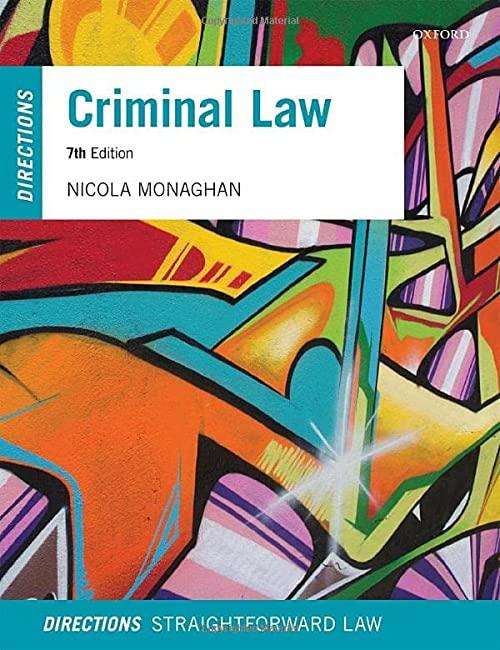Question
Tom owns a clothing store that sells high end second hand clothing. He was having a hard time getting enough stock from consumers wanting to
Tom owns a clothing store that sells high end second hand clothing. He was having a hard time getting enough stock from consumers wanting to sell their clothes to him directly or selling them via consignment.Luckily, Tom found a wholesaler that dealt specifically with high end second hand clothing. The wholesaler and Tom agreed upon a price of $5 per pair of pants, $4 per shirt, $12 per suit jacket or blazer, $3 per tie, $5 per pair of shoes and $1 per pocket square.
Tom was going to order the following:
100 pairs of pants for $500
100 shirts for $400
100 pocket squares for $100
100 pairs of shoes for $500
100 ties for $300
100 Jackets or Blazers for $1200
He was counting on this order to restock his shelves as his stock was running dangerously low.
For purposes of this question only, consider the additional facts. Tom and the wholesaler did not specify when the items were to be delivered. The wholesaler delivered the items to Tom's store six (6) weeks after placing the order. This was unacceptable to Tom because for 6 weeks he was losing business to his competitor across the street from him because of his dwindling inventory
If Tom were to sue the wholesaler for breach of contract, what is the likely outcome of the lawsuit? Choose the best answer for who is likely to win and why.
Select one:
a.
Tom wins because the wholesaler allowed Tom to rely on their promise to his detriment.
b.
The wholesaler, because a contract must have reasonably definite terms and because no delivery date was set, they had a voidable contract and the seller could void the contract, rendering it unenforceable.
c.
Tom, the wholesaler had to deliver the items within a reasonable amount of time after purchase and six (6) weeks is too long under second hand clothing industry standards.
d.
The wholesaler, the terms of Tom's offer and their acceptance do not match and therefor the contract is unenforceable.
Tom owns a clothing store that sells high end second hand clothing. He was having a hard time getting enough stock from consumers wanting to sell their clothes to him directly or selling them via consignment.Luckily, Tom found a wholesaler that dealt specifically with high end second hand clothing.
The wholesaler and Tom agreed upon a price of $5 per pair of pants, $4 per shirt, $12 per suit jacket or blazer, $3 per tie, $5 per pair of shoes and $1 per pocket square. Tom was going to order the following:
100 pairs of pants for $500
100 shirts for $400
100 pocket squares for $100
100 pairs of shoes for $500
100 ties for $300
100 Jackets or Blazers for $1200
He was counting on this order to restock his shelves as his stock was running dangerously low.
Using the basic facts of this story answer the following but do not apply any facts from previous questions.There was no written contract in place between the parties. Tom was the only retailer that the wholesalers sold to that was interested in buying pocket squares. Nobody else wanted them.
Tom knew this and offered to buy every pocket square that the wholesaler bought so long as it was clean and presentable. Then the wholesaler found a manufacturer that would sell them 50,000 brand new custom pocket squares for $0.25/piece. The wholesaler contacted Tom and offered them to him for their previously agreed upon price with Tom's company logo discreetly embroidered on every single one of them. Tom loved the idea and agreed right away.
If Tom changed his mind after the wholesaler bought them from the manufacturer, who would win and why? Choose the best answer.
Select one:
a.
Tom, the contract was not in writing and therefore was unenforceable
b.
Wholesaler because the contract is enforceable because Tom is a merchant
c.
Wholesaler because the agreement is enforceable under the Statute of Frauds
d.
Tom, the wholesaler contacting him to buy the pocket squares was not a valid offer since they already had a prearranged agreement regarding the sale of second hand goods.
Tom hired Mona Lisa to be his store manager with a two year contract. When hired, her duties were only to open and close the store daily and to manage the other associates in the store by making the daily schedule. Tom later added the duty of balancing the books and registers at the end of the day to her job duties. Eventually she was fired because she rarely if ever did the books as he asked and when they were done, they were rarely done correctly.
True or False -Firing her was not a breach of her employment contract because merchants can add additional terms to their contract because Mona Lisa did not object to the new terms of the contract in a reasonable time in accordance with UCC 2-207(2).
Select one:
True
False
Step by Step Solution
There are 3 Steps involved in it
Step: 1

Get Instant Access to Expert-Tailored Solutions
See step-by-step solutions with expert insights and AI powered tools for academic success
Step: 2

Step: 3

Ace Your Homework with AI
Get the answers you need in no time with our AI-driven, step-by-step assistance
Get Started


